Press Release
Grassroots Community Development is proud to announce a phase V of its highly successful roof repair program to help low income families with repairing their roofs. In the rainy months we receive calls from families with terrible roof problems. This fifth phase of our program hopes to address some of that need. Grassroots Community Development is finishing up the completion of 125 roof repairs for families and is starting a Phase V of these efforts.
The services provided by Grassroots Community Development Corporation are made possible in part through a grant from the City of Waco. The program is free to low-income families that live in the City of Waco. We have enough funds to repair around 15 roofs. We will open up enrollment for the program August 15th with a deadline to accept applications of October 15th. We will begin evaluating homes in October/November, then we will be hiring roofing contractors to complete the roofing projects.
Applications are available at our office or via our Website: www.GrassrootsWaco.org or we can email you an application.
For more information about the Roof Repair Program or about Grassroots Community Development call Mike Stone 254-235-7358 Ext 206
About Grassroots Community Development Grassroots Community Development was formed in 2001 and is located at 1624 Colcord Avenue. Our mission is “committed to a brighter future for children, neighbors and communities.”
Grassroots Community Development is committed to a brighter future for children, neighbors and communities. The organization operates with the mindset that cultivating healthy neighborhoods is more than just building attractive and affordable homes. Community members must work alongside each other to create sustainable change. Building intentional and authentic relationships with neighbors is at the heart of what Grassroots does. The team at Grassroots aims to bring neighbors together to work towards community driven change. Children are served through community supported reading clubs at the elementary schools. Neighbors are served through leadership development training classes, and free education and counseling to prepare families to become homeowners. Communities are served through roof and external home repair programs for the disabled and elderly, building new homes and community enhancement projects. Contact the team for how they can help you.
Visit http://www.GrassrootsWaco.org or the Facebook page https://facebook.com/ GrassrootsCommunityDevelopmentWaco to learn more information about Grassroots Community Development.
Press release –
As the Texas summer heat settles in and the index raises to triple digits, The Salvation Army reminds people about their cooling station open in downtown Waco, open to anyone seeking some salvation from the heat.
The cooling center is conveniently located at 300 Webster Avenue and remains open until 4:30pm, closing only briefly to allow the staff to prepare for dinner service when the center reopens its doors as the Community Kitchen, ready to serve anyone seeking a nourishing meal.
“The cooling center is open any day the temperature or heat-index reaches 100 degrees or higher, which it is doing pretty consistently” says Jorge Delgado, The Salvation Army Shelter Director. “Prolonged extreme heat, as is about more than discomfort, it is a public health risk. Our cooling centers are open to everyone. Guests can stay for hours, or simply stop-in to cool-off and have a refreshment before continuing with their day” said Delgado. “Our guests run the gamut” he continued, “Some may be homeless or residents living in homes without air conditioning. They may work outside or be one of the passersby strolling through downtown. The dangers of extreme heat can affect anyone, from any walk of life, which is why we welcome all to stop in our center.”
Cooling centers truly do serve the health of the community by providing two things necessary to reduce the risk of heat exposure:
- Hydration. It’s especially important for people to drink water before they get thirsty and to continue drinking throughout the day.
- Cool-down time. Time spent in air-conditioned environments helps the body cool off and lessens the likelihood of getting overheated.
Refreshments, including water and snacks, have been provided by the community. The Salvation Army is most in need of donations of bottled water or beverages so they may continue serving during these final days of summer.
This summer heat also serves as a reminder to check on neighbors such as the elderly, shut-ins, or those neighbors living in much older homes with insufficient cooling systems. The Salvation Army has several box fans available free of charge to anyone in need, thanks to a recent Fan Drive with Keith ACE Hardware locations throughout Central Texas.
Contact The Salvation Army at 254-756-7271 for additional information.
By Amy Hammerton
August has somehow sneaked up on us again, which means back to school season is in full swing. For college students, going back to school means lots of additional expenses. Between tuition, text books, and housing costs, it’s no secret that college is expensive. With all these costs, it can be hard to find room in your budget for the fun stuff like a new wardrobe for the new semester and cute dorm decor. But don’t worry because there is a solution for all your budget-conscious needs: shop at Goodwill. Thrifting is the best, most sustainable option for updating your wardrobe, decorating your dorm room, and finding just what you need to start off the school year right.
Buying secondhand at Goodwill means you can find stylish (even name brand!) clothes at a tiny fraction of what you would normally pay—perfect for the tight college budget. And Goodwill has something for every occasion. So whether you’re looking for workout gear, an outfit for a night out, or that pair of comfy sweatpants you’re probably going to live in come finals week, Goodwill has got you covered.
You can also find almost everything you need to deck out your dorm or apartment. Need a lamp, end table, desk, or chair? Why not check Goodwill for some of the best deals you’re likely to find anywhere. You can also find wall décor and picture frames perfect for displaying all your favorite college memories. And don’t forget to check the glassware section for storage options for all your desk supplies and knickknacks. Especially if you get a little creative with it, the possibilities are nearly endless.
Not only can you score great finds at even better prices when you shop at Goodwill, you can feel good about doing it. One of the best parts about shopping at Goodwill is that you know exactly where your money is going. Every penny you spend at Goodwill supports their many mission service programs. These programs help empower people through work, creating opportunities for those with disabilities or other disadvantaging conditions to develop the skills and resources they need to find sustainable employment. So when you shop at Goodwill, not only do you know you’re getting good prices, you know that your money is going to support the community—a great deal all around.

Amy Hammerton is a Baylor University Senior studying English Literature, Journalism and Graphic Design. This summer, Amy has worked as a Heart of Texas Goodwill Marketing Intern developing social media content, creating brand collateral and promoting the mission of Goodwill through various media outlets. In her final project, she leans on her own experience as a college student living on a budget. In this blog series; Goodwill Goes to College, Amy shares how Goodwill can serve as a significant resource for her fellow student body to save money, get organized and be socially responsible keeping unwanted items out of the landfill through donations.
The Act Locally Waco blog publishes posts with a connection to these aspirations for Waco. If you are interested in writing for the Act Locally Waco Blog, please email [email protected] for more information.
By Garland Hancock
“But what can I do?”
I think most of us have asked that question at one time or another.
We hear a story on the radio about tensions and even violence between nations around the world and many of us think — “Why is it so hard for us to get along? We are all people. We all have the same basic needs. We all love our children. Why can’t we learn to understand each other?” And finally, “But what can I do?”
If you would like to take that question seriously and also have a wonderful learning experience for your own family, I have a suggestion – host a foreign exchange student this school year.

I have worked with foreign-exchange students — in one way or another — for nearly 20 years now, and nothing has given me greater pleasure. To watch these kids culturally mature before your very eyes is priceless. More than that, though, I am absolutely convinced that America’s foreign-exchange programs play an integral role in facilitating our diplomatic relations abroad.
This year we have an urgent need for Waco area host families for 15 students from two important exchange programs: FLEX and YES.
FLEX
The Future Leaders Exchange (FLEX) Program is a United States Department of State-sponsored program for secondary school students from Armenia, Azerbaijan, Estonia, Georgia, Kazakhstan, Kyrgyzstan, Latvia, Lithuania, Moldova, Montenegro, Poland, Romania, Serbia, Tajikistan, Turkmenistan, and Ukraine. The program provides merit-based scholarships for students to travel to the United States, live with a host family, and attend a U.S. high school for a full academic year.
FLEX was established in 1992 and funding is provided through the U.S. Department of State’s Bureau of Educational and Cultural Affairs. The program was created from the conviction of former Senator Bill Bradley that the best way to ensure long-lasting peace and understanding between the U.S. and the countries of Eurasia is to enable young people to learn about the U.S. and Americans firsthand, and to teach Americans about their countries.
The primary goal of the FLEX program is to improve mutual understanding and develop and strengthen long-term relationships between citizens of the United States and other peoples and countries.
YES
The Kennedy-Lugar Youth Exchange and Study (YES) program was established by Congress in October 2002 in response to the events of September 11, 2001. The program is funded through the U.S. Department of State and sponsored by the Bureau of Educational & Cultural Affairs (ECA) to provide scholarships for high school students from countries with significant Muslim populations to spend up to one academic year in the United States. Students live with host families, attend high schools, engage in activities to learn about American society and values, acquire leadership skills, and help educate Americans about their countries and cultures. The first class of YES students arrived from Egypt, Gaza, Indonesia, Jordan, Kuwait, Lebanon, Malaysia, Nigeria, Pakistan, Syria, Tunisia, Turkey, West Bank, and Yemen.
How do I get involved?
Both of these programs are incredibly selective. Only 3 percent of those who apply and submit essays are actually admitted. Which is to say these are cream-of-the-crop, “yes ma’am, no ma’am” kids who are hyper-focused on developing skills here in America that will allow them to assume leadership roles once they return back home. They arrive here full of vigor and purpose. And all are proficient in English.
Why the urgency? Students from around the world have been accepted into these highly competitive programs; but with the school year nigh upon us, many of these kids are still in need of host families or, at least, “welcome families.” So, as a coordinator with American Councils for International Education, I am working around the clock to make sure these well-deserving kids can pack their bags for Waco!
So, what are your costs/responsibilities should you decide to host one of these wonderful kids? Hosts must assure their students have transportation to and from school; so, if you are on a bus route, you are already set. Other than that, you simply provide room and board. And anytime the student might dine outside the home — for example, at the school cafeteria, or when accompanying your family to a restaurant — he or she is on his or her own.
Plus, the students come fully insured; and with the scholarship dollars they receive through acceptance into the FLEX/YES programs, they are required to budget for all personal expenses — entertainment, toiletries, school supplies, etc.
I am sure you have questions so please call me at your earliest convenience — today would be great! — at (254) 216-0460.
These kids are driven. They inspire. And they will win your heart. The bond you forge will last forever. The worst thing about hosting is that one day soon you will have to say goodbye. Best of all, you can rest assured that your student will ultimately pay it forward – hosting one student can start a chain reaction that can touch hundreds or even thousands of people back in their home communities. That’s what you can do that will really make a difference.

Garland Hancock is a free-lance journalist who publishes the Texas-based magazine J.D. Mayo’s Full-Court Press. In his free time, the China Spring resident and amateur percussionist travels the world to feed his passion for live, indigenous music. Garland has been working with foreign-exchange students for nearly 20 years and, as a part-time Language Arts tutor who specializes in ACT/SAT prep, he dedicates much of his schedule to helping ESL learners realize their dream of attending an American college.
The Act Locally Waco blog publishes posts with a connection to these aspirations for Waco. If you are interested in writing for the Act Locally Waco Blog, please email [email protected] for more information.
By Meredith Palmer
What makes Waco, Waco? Is it the booming business climate? Maybe it’s the wide array of philanthropic organizations? Or the up-and-coming arts sector? The Greater Waco Chamber of Commerce hopes to give people a glimpse of how Wacoans live through its second annual “Find Your Waco event.”
Find Your Waco is a “Life Fair” and a great place to learn about all things Waco. The purpose of the “Life Fair” is to connect attendees to different components of the community. The 2019 Find Your Waco Life Fair will be held on Wednesday, Oct. 16 from 2 to 6 p.m. at the Freedom Fountain and Waco Convention Center.
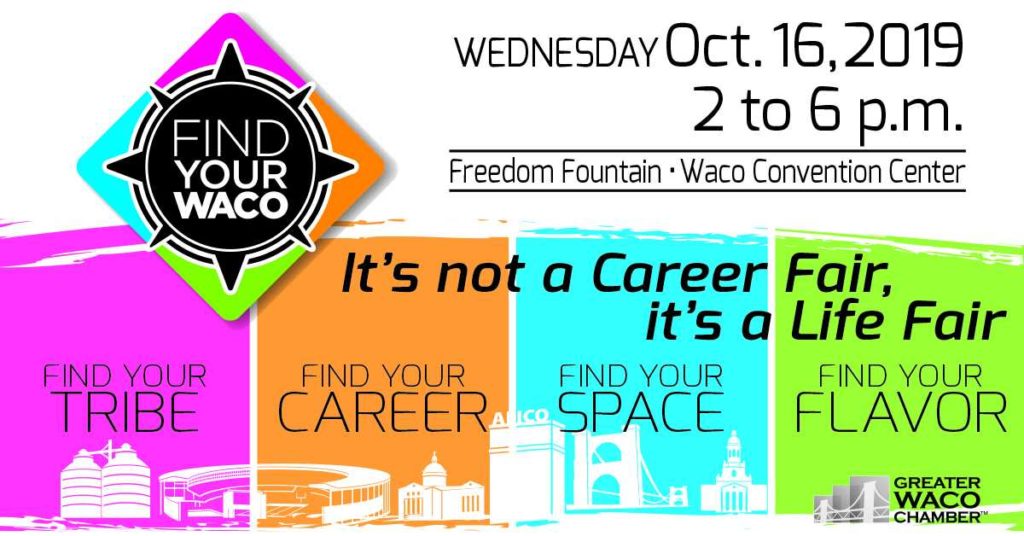
How does Find Your Waco differs from the “old-school” job fair? While this event does feature businesses and organizations offering employment opportunities, it also focuses on other outlets that make the Waco area an exciting place to live.
Find Your Waco consists of four “quads” which attendees are encouraged to explore. These include Find Your Tribe, Find Your Career, Find Your Space, and Find Your Flavor.
Find Your Tribe helps attendees connect with people and organizations in the area. There will be a variety of organizations present including, churches and religious groups, non-profits, fitness facilities, networking groups, and sporting groups.
Find Your Career encourages attendees to get plugged in with local employers. Participating employers may be looking for full time, part-time, or internships candidates from a range of fields such as education, healthcare, tech and manufacturing.
In Find Your Space, attendees can find out what life is like in Waco and look for a place to call “home.” Several real estate companies, apartment complexes, hotels, construction and roofing companies, banks and school districts will be present to inform attendees about the living climate in the area and explore financial options.
Find Your Flavor gives attendees a taste of the unique food services, culinary practices of the area. Industries represented will include restaurants, bars, wedding venues, sporting activity companies, grocers, and car dealerships. Find Your Waco is proudly partnering with Waco Food Hub, a local start-up creating a multi-station shared kitchen space for Waco food artisans, to showcase the variety of different eateries, wineries, craft breweries and food trucks in the area. This year, attendees can sample food and drinks from exhibitors in the Find Your Flavor quadrant.
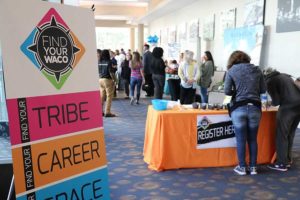
Last year, around 500 attendees participated in the Find Your Waco life fair. Jennifer Branch, Director of Existing Industries & Workforce Development for the Greater Waco Chamber of Commerce, said this number exceeded expectations and demonstrates the need for such an event in Waco’s growing community. There is no charge for people to attend Find Your Waco and the Chamber is hopeful the event will draw in a large and diverse group of attendees to the life fair again this year.
Recent graduates, transitioning military veterans and their spouses, area visitors and traditional job seekers are encouraged to attend Find Your Waco. Last year, buses transported military veterans and their families between Fort Hood and Waco, so they could participate in Find Your Waco.
For locals, Find Your Waco is a great time to learn about different ways to get plugged into the community. Branch said she hopes attendees will learn about different things Waco has to offer from the wide range of exhibitors featured in the different sections of Find Your Waco.
Exhibitors who participate in Find Your Waco have the opportunity to find their next great employee, team member or volunteer and to network with other businesses and potential customers. For Manpower Central Texas, a career placement and development agency, Find Your Waco proved to be a great return on investment. Jodi Morgan, Business Manager for Manpower in Central Texas, said Find Your Waco opened up a new market for Manpower to explore. Over 110 people filled out interest forms at Find Your Waco, and Manpower was able to add nearly ten companies to their pipeline. “For any business that is on the fence about Find Your Waco, I’d encourage them to try it. You’ll get face time in a potentially untapped market,” Morgan said.
So, if you are new to or looking to move to the Waco area, have been here your whole life, or are somewhere in between, Find Your Waco is a great opportunity to show off your business or organization, network with others and learn more about Waco.
Businesses that are members of the Greater Waco Chamber of Commerce and of the McLennan County Chamber Alliance (MCCA) will receive discounted exhibitor booth prices. To register as an exhibitor or learn more about the Find Your Waco Life Fair, visit the Facebook event page (https://bit.ly/2LbOBNC) or contact Jennifer Branch at [email protected] or (254) 757-5625.

Meredith Palmer had the opportunity to intern at the Greater Waco Chamber of Commerce this summer for the Marketing & Communications Team. She is a local Wacoan and graduated from China Spring High School. Meredith is a rising senior at the University of Texas at Austin where she is studying journalism. Meredith enjoys spending time with her family and friends, traveling and reading.
The Act Locally Waco blog publishes posts with a connection to these aspirations for Waco. If you are interested in writing for the Act Locally Waco Blog, please email [email protected] for more information.
Top 10 “Most Opened” Blog Posts of 2019: # 9
Is your child looking for something to do this summer? Why not encourage him/her to write and illustrate a novel? That’s What Kamayah Miles did!

Kamayah Miles is 9 years old and will be a 5th grader at Connally Elementary. She developed a love for writing at the age of 5. Kamayah’s other hobbies are drawing, arts/crafts, reading and baking cookies with her mom. She dreams of being an author and a chef.
We have some pretty amazing young people in our community! Here is Kamayah’s novel: Runaway Rockstar! Read it now so you can say…”I knew her when…” Thanks for sharing your work with us, Kamayah! We are proud of you!
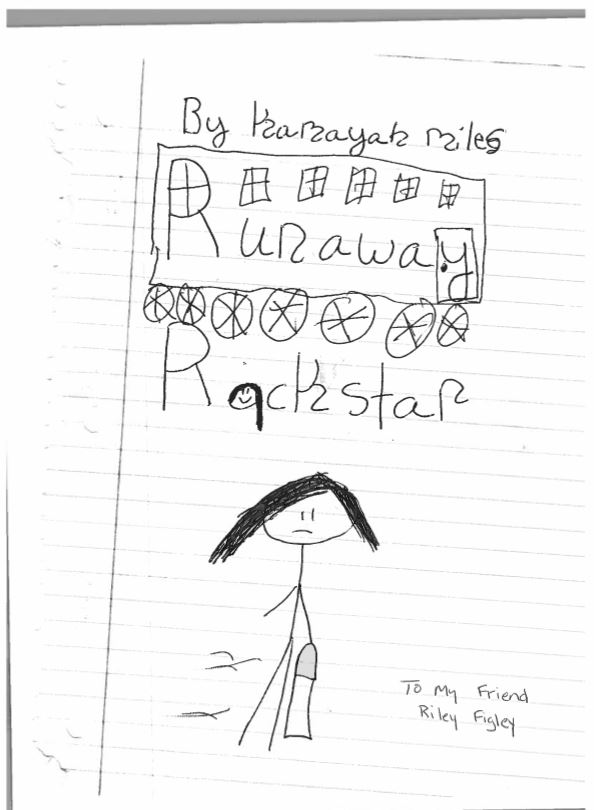
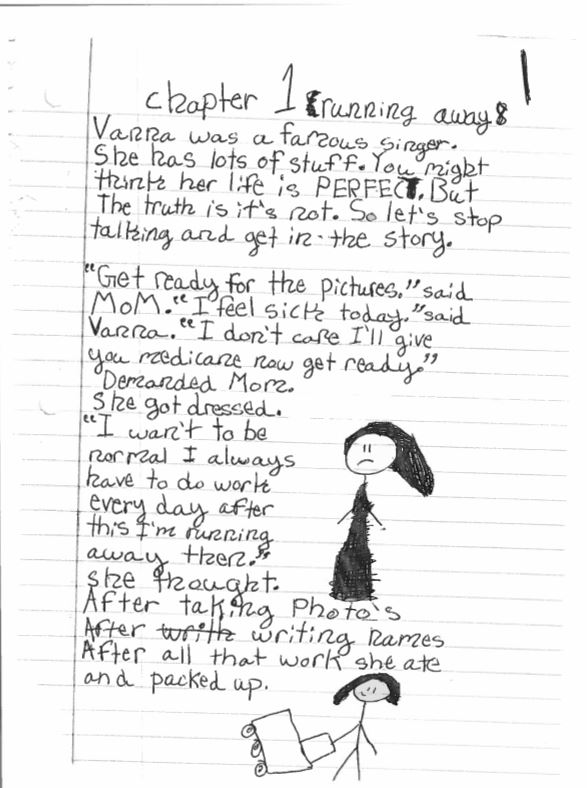
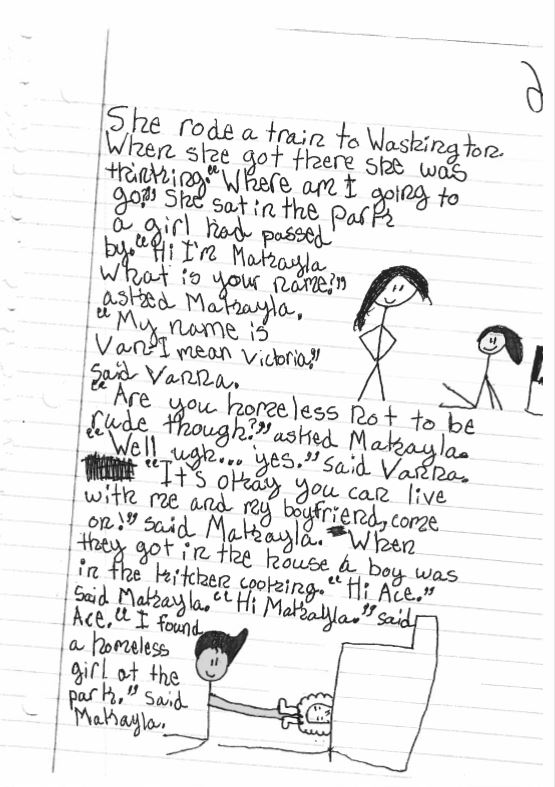
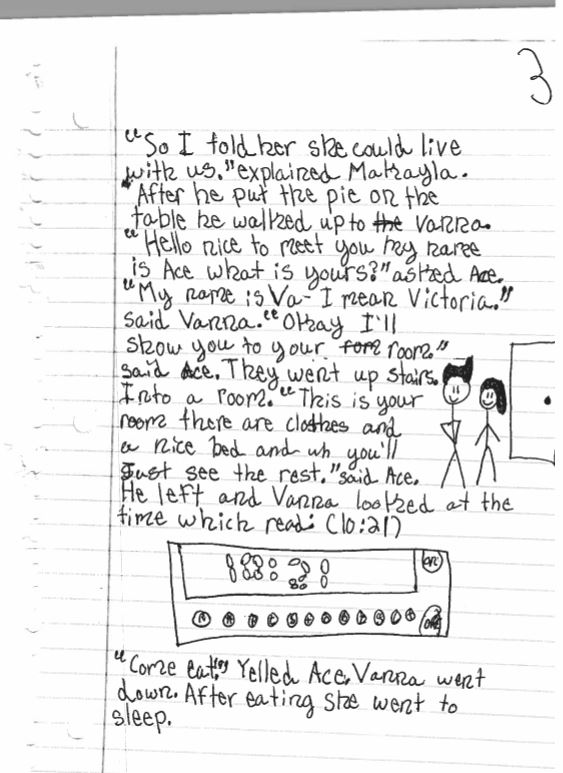
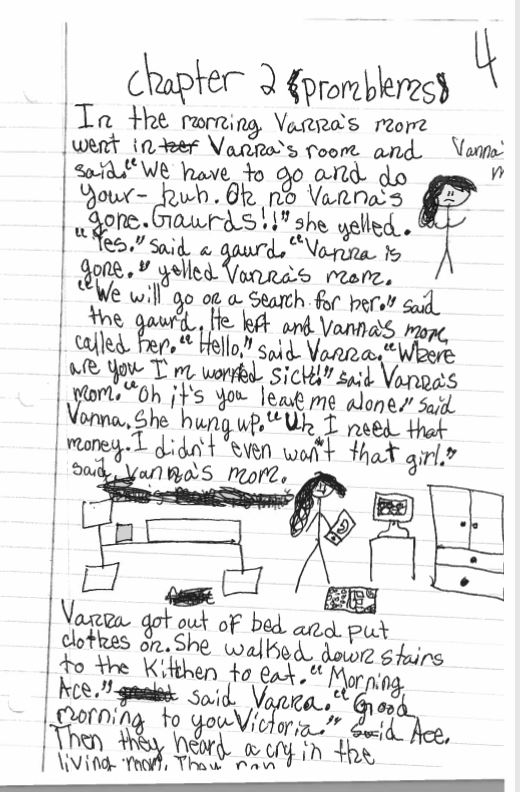
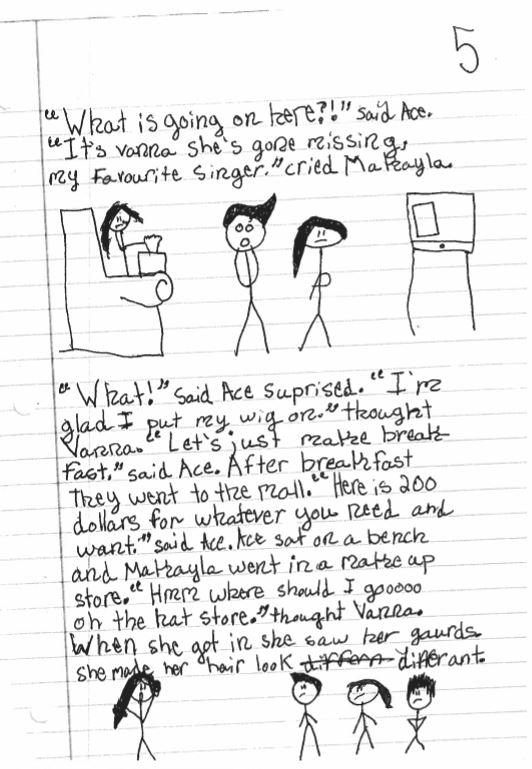
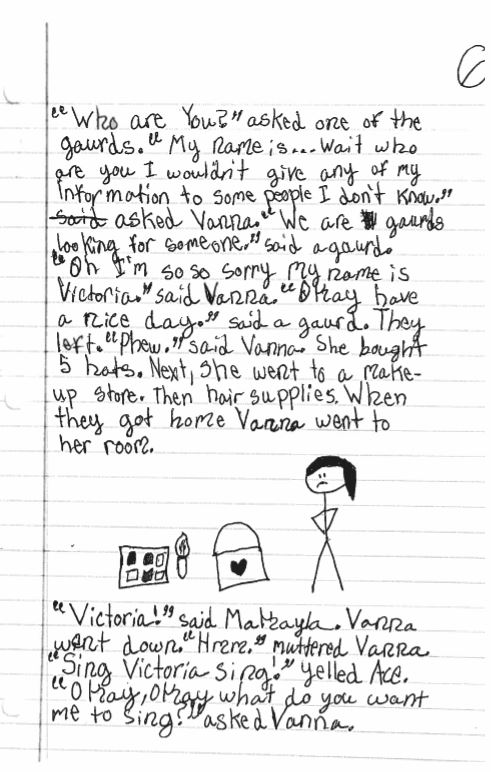
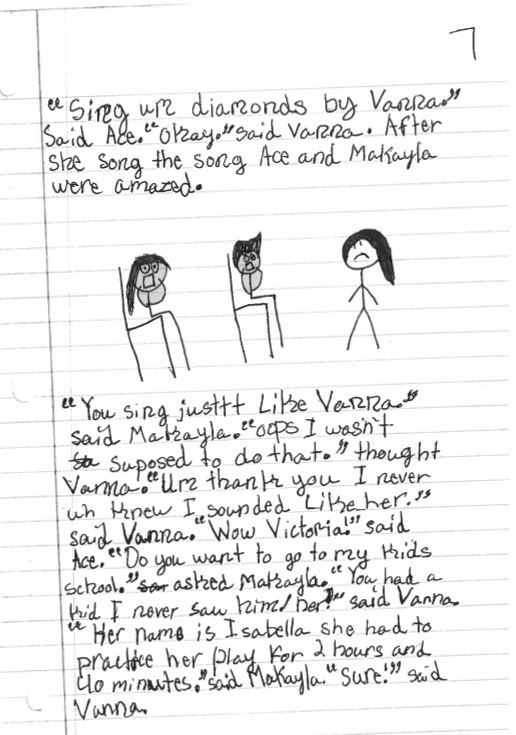
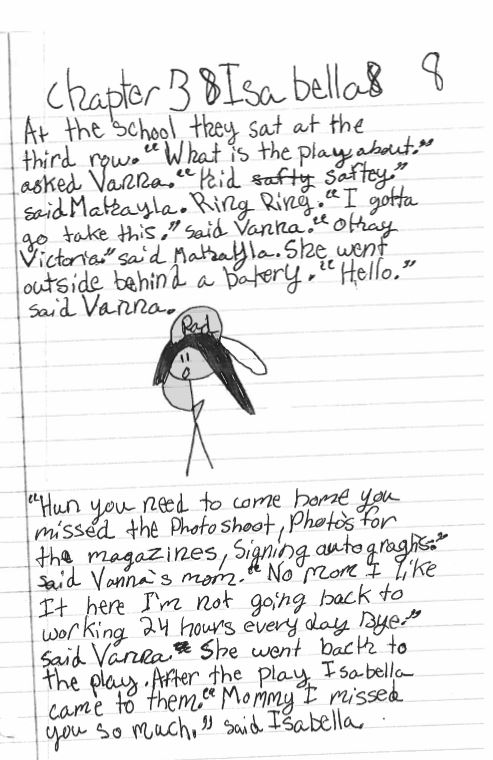
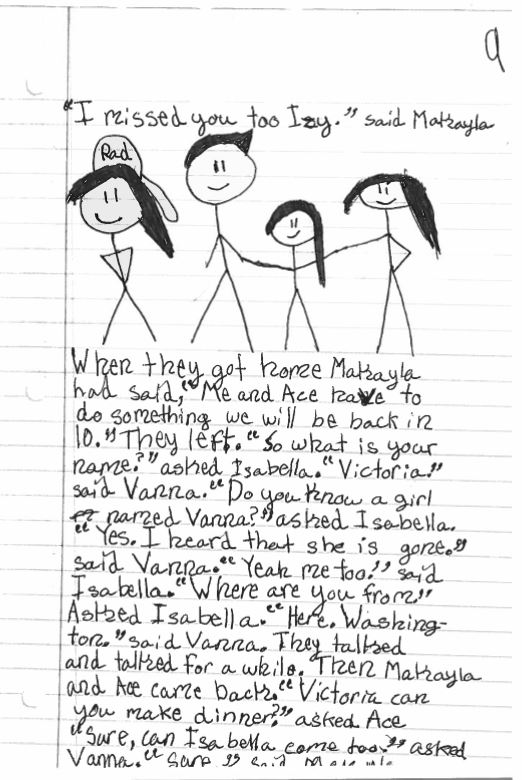
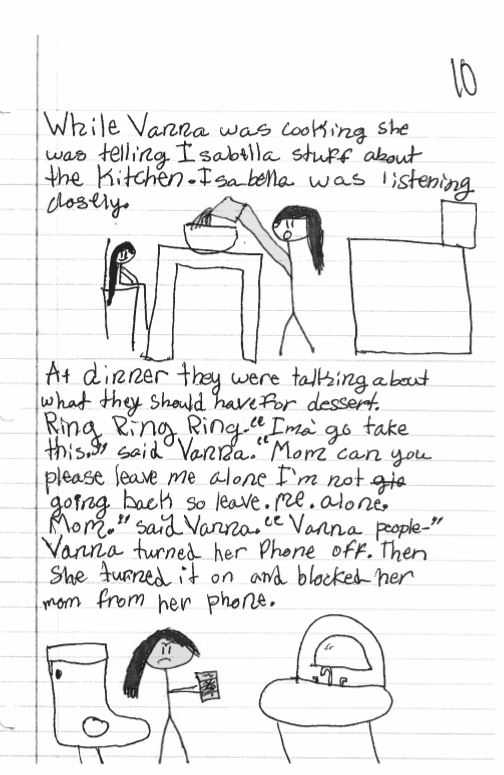
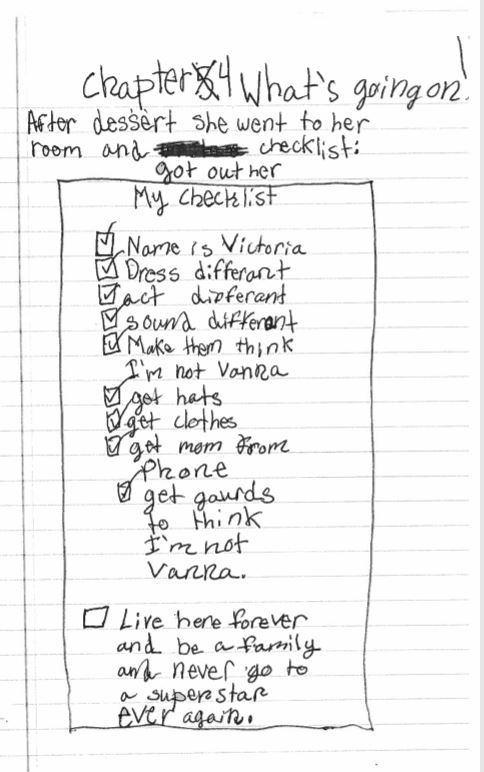
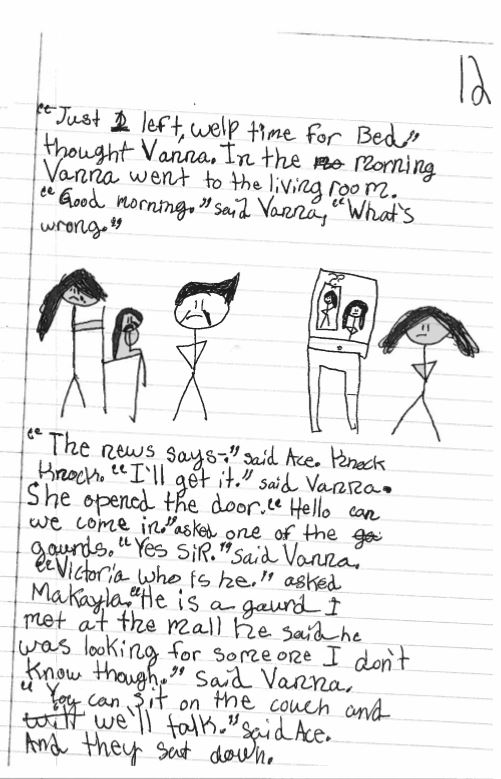
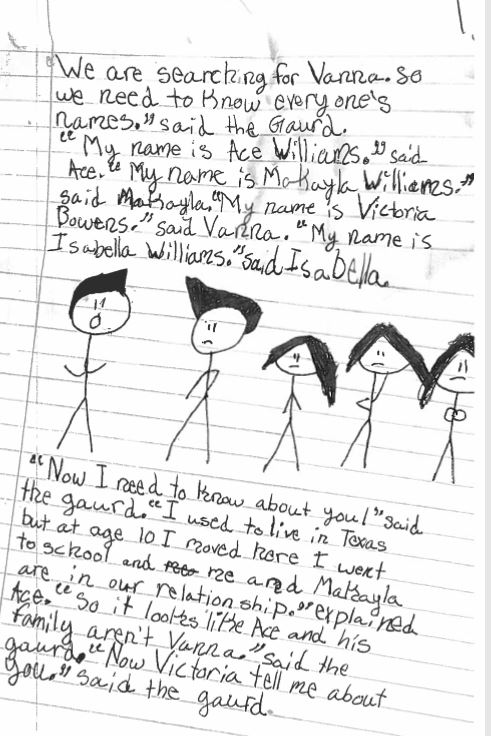
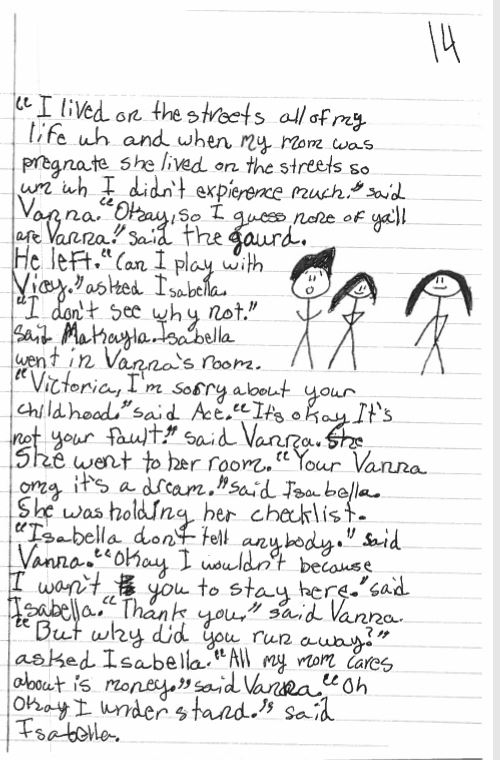
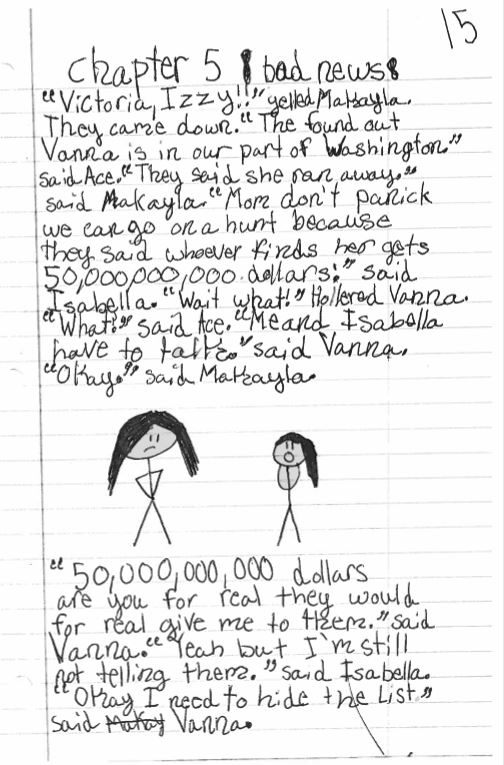
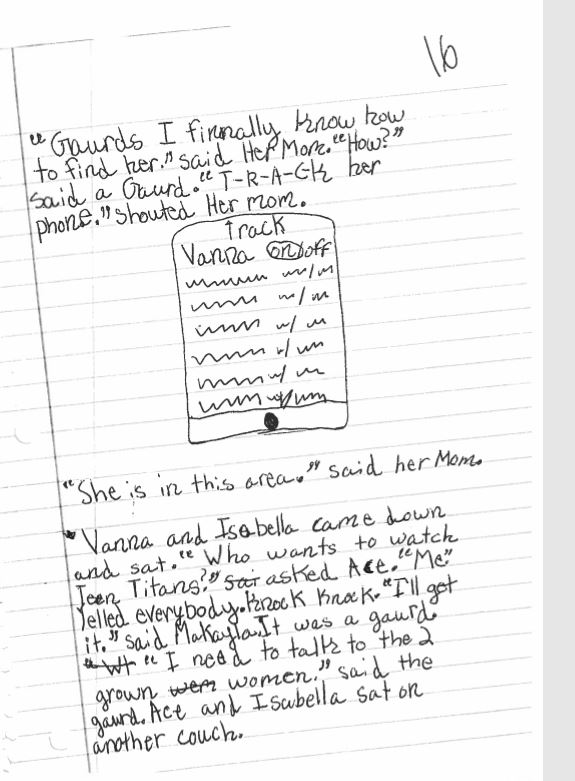
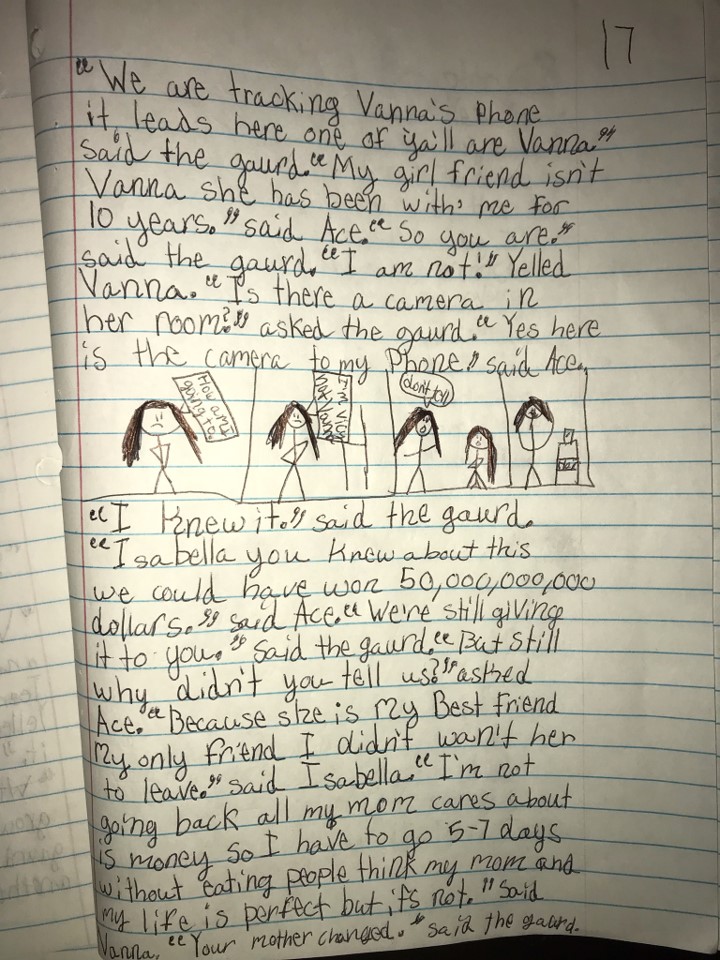
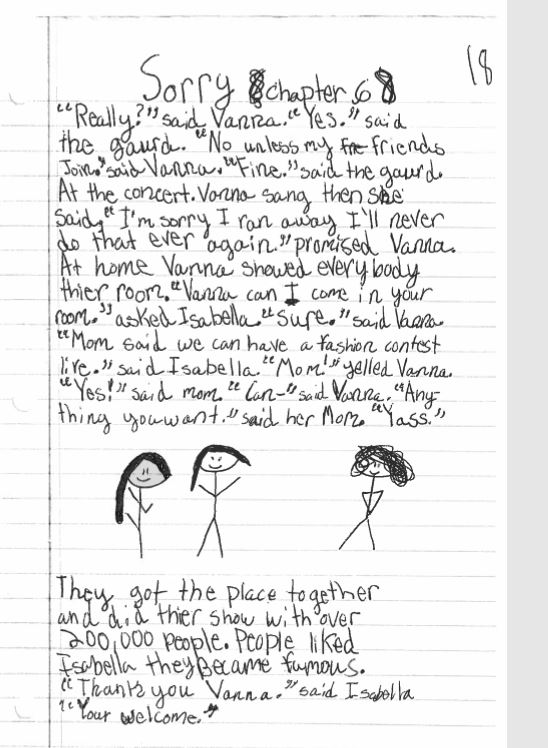

By Khristian Howard
If you’ve been around Waco for a while, you have probably noticed tons of service opportunities, programs, and projects – and many of these are kid-centered. Right now, the city is sprinkled with summer meal sites ranging from traditional sites like rec centers and schools to mobile meal busses. This summer, Waco ISD even premiered a food truck to serve meals to kids in low-income areas! In the hype, it is easy to see the passion that exists around feeding children. The momentum continues to grow throughout the school year, as after-school enrichment programs pop up on every side of the city. In McLennan County, there are over 14,000 children experiencing food insecurity, so being able to provide a meal for a child is integral in shaping a healthy future for this community (Map the Meal Gap, 2019). Larger organizations like the YMCA and Boys and Girls Clubs have the abundance of resources necessary to provide food for their participants; however, for smaller after-school programs, meeting this need can be more challenging.
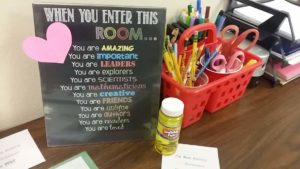
Such is the case for NewLife Alliance, a Christian 501(c)3 organization that “fosters communities of encouragement and empowerment for people of all ages and abilities.” Nationally, NewLife Alliance represents a collection of businesses, community organizations, churches and schools. Here in Waco, in Red Oak Townhomes (located at 4510 S. Third Street in Waco), the organization functions as an after-school program that provides educational and spiritual enrichment for the children living in this community. We sat down with Jina Jones, Program Coordinator, for Red Oak Townhomes, to talk about the value that the program brings to the community and its children.
Here’s the Scoop…
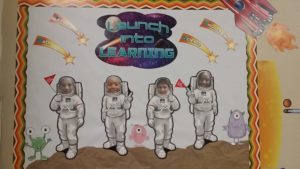
“There are so many valuable pieces,” Jina shared, “from spiritual studies, to health and nutrition events, to counseling and community safety events, [and even] direct support with toiletries and goods…but I would have to say that the youth program is the most valuable piece.” Being able to reach the youth means everything to this community, and NewLife Alliance serves to meet a serious gap for parents with limited resources. “Providing help with homework, meals, spiritual studies, and character building in a safe environment for our youth is such a huge help to the families that are income challenged and may not be able to pay for the cost of after-school care otherwise,” stated Jina.
Meal and snack sponsors needed
However, the program itself is experiencing a tight limit on resources as well. The previous meal sponsor for NewLife Alliance is no longer able to extend meal services to the part of town where the Red Oak Townhomes are located. This leaves the program without a way to ensure food for the children who participate. Jina expounded on just how serious the current predicament is for the life of the program and the kids who participate:
“We never truly know the struggle of each family here on the property and whether the meal we provide will be the last meal of their day or maybe just the healthiest meal they receive. Our problem is that because we are a non-profit, we run [out] of donations and sometimes struggle to meet the needs of the families because of lack of donations. Donations mean the world to families in need of help.”
Can you help?
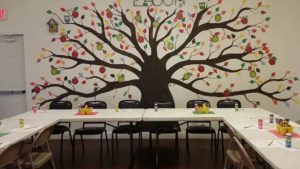
For this reason, we are asking you to consider making a donation of food or money to help Jina and NewLife Alliance continue to feed the children in their programs. Food options range from full, hearty meals to simple snacks, so no contribution is too small. NewLife Alliance has been serving Red Oak Townhomes in Waco for 14 years, and with your help, the program can continue to meet the needs of children and families there.
Sign Me Up!
So, if you would like to make a donation, here are a few things to keep in mind:
- This program meets three times a week on Tuesdays, Wednesdays, and Thursdays
- Each week about 20 – 25 kids participate
- The program coordinator has opted to keep all meals and snacks peanut-free due to severe allergies among the kids
To make a donation or to get more information, please reach out to Jina Jones, NewLife Alliance Program Coordinator in Red Oak Townhomes at [email protected], or Khirstian Howard, AmeriCorps VISTA at Texas Hunger Initiative at [email protected]. We truly appreciate your help and support for the community!

Khristian Howard is an Atlanta native and a recent graduate of Georgia State University where she earned a Bachelor’s Degree in Social Work. She has a passion for empowering communities through service, and seeks to connect advocacy to creativity. Currently, she is serving as the AmeriCorps VISTA for Texas Hunger Initiative Waco, where her work focuses on fostering collective impact to improve health and eating habits in East Waco. When she is not working, you may find her sharpening her culinary skills or exploring new poetic and artistic pathways.
The Act Locally Waco blog publishes posts with a connection to these aspirations for Waco. If you are interested in writing for the Act Locally Waco Blog, please email [email protected] for more information.
References:
Map the Meal Gap. (2019). Overall and child food insecurity by county in 2017. [Table] Retrieved from https://public.tableau.com/profile/feeding.america.research#!/vizhome/2017StateWorkbook-Public_15568266651950/CountyDetailDataPublic
(As I’m sure most of you probably know, one of our Prosper Waco community goals is “McLennan County residents will live healthier lifestyles and access the best available care.” With that in mind Act Locally Waco is teaming up with Better Living for Texans to bring you a monthly blog post full of tips for healthy living. For more of the posts in this series, click here: Better Living for Texans.– ALW)
By Flor De La Garza
The belief that “eating healthy and nutritious is expensive” is a common misperception. There are several ways to save money and buy healthy foods for you and your family. Today’s focus is to provide tips and tricks to save money when buying healthy groceries by 1) identifying the in-season fruits and vegetables 2) comparing unit prices, and 3) planning meals in advance.
Know Your Seasonal Produce
You may have noticed the recent influx of watermelons, cucumbers, zucchini, corn, and many more fruits and vegetables at your local grocery store. This is because there are certain fruits and vegetables that harvest in the summer, just as there are fruits and vegetables that harvest best in other seasons (spring, fall, and winter). Knowing the “in-season” produce for each season may help you save money because the in-season food items may cost less. For example, as summer reaches its peak, you may find watermelons to be at a cheaper price than in the winter season. If your favorite produce is not in season, an alternative to eating healthy and at a cheaper price is to buy canned or frozen produce without added salt or fat. Below is a Seasonal Produce guide made with information retrieved from the U.S. department of Agriculture – SNAP Ed (https://snaped.fns.usda.gov/seasonal-produce-guide) that can serve as a guide as you shop for in-season produce next time you are shopping for groceries.
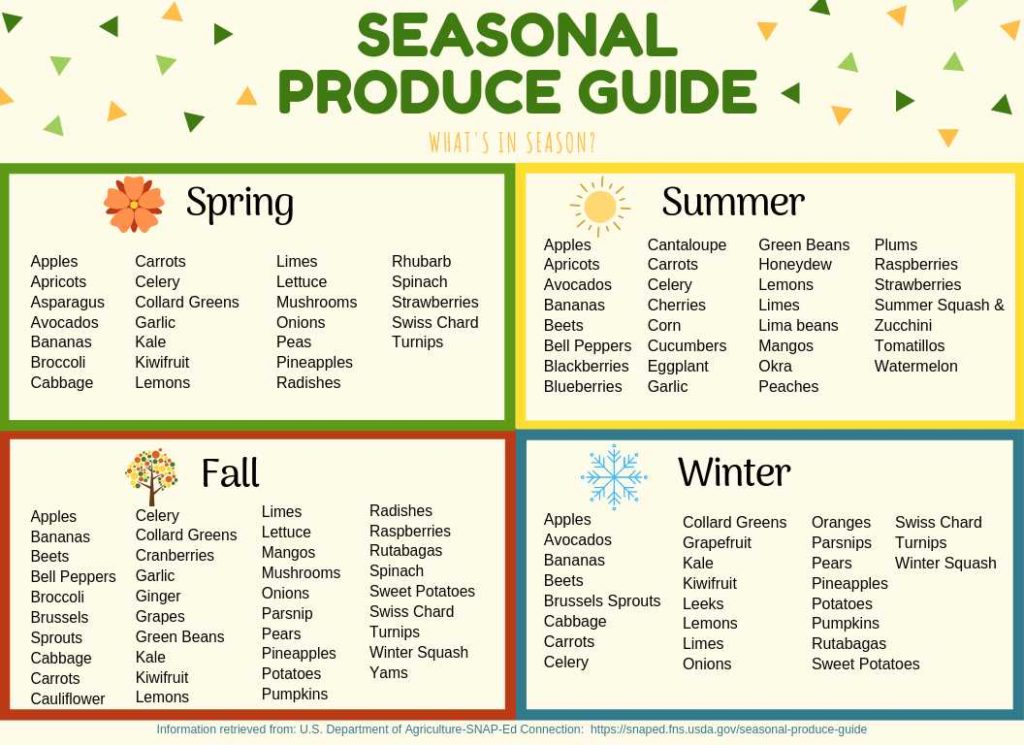
The grocery store is not the only place you can save money when shopping for produce. Starting your own garden or shopping at the farmers market is a great way to obtain inexpensive, freshly picked in-season produce. The Waco Downtown Farmers Market opens every Saturday from 9 AM – 1 PM and is located at 500 Washington Ave, Waco, TX. 76701 – you can save money, enjoy the outdoors, and contribute to local small businesses all in one trip! If you are interested in starting your own garden, the McLennan County Master Gardeners can provide you with advice, direction, and answer any questions you may have. They are available to answer your gardening questions Tuesdays and Thursdays from 1:30 PM – 4:30 PM at (254) 757-5180. You may also connect with the McLennan County Master Gardeners at the farmers market as they set up a semi-monthly booth to provide outreach on a variety of gardening topics.
Remember: fresh, frozen, canned, and dried – it all counts!
Comparing Unit Prices
To decide on the “cheaper option” within food items, one common way to compare prices is to look is to look at the total price of two items and simply compare them to determine which price is the lowest. However, this tactic may not always work because of the packaging, weight distribution, or size difference of both items. A more beneficial alternative is to compare unit prices. The unit price is the cost of an item based on a specific unit, such as a pound, ounce, or quantity per container.
Knowing the unit price can allow you to compare the cost of a food item based on brand and size. For example, (see below for picture) when buying XYZ Yogurt, it may appear that the total price of the 6-ounce (oz) yogurt is the cheaper option when compared to the 32 oz yogurt. However, when comparing the unit prices, the 32 oz yogurt is .07 cents cheaper per ounce.
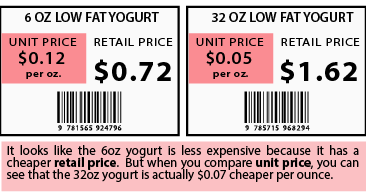
Planning Meals in Advance
Scenario: You go to the grocery store. You buy some spinach, zucchini, cucumber, and corn because you know these items are “healthy” and “in-season”. You get home. Now what? You look up healthy recipes and realize you need a few more items to complete the recipe. You make a trip back to the store and buy more items than you needed. Now you are back home, and you are over your groceries budget.
The scenario above is very common. You can prevent going over your budget by planning your meals and writing a grocery list before going to the grocery store. You can plan healthy meals that use “in-season” produce and follow the MyPlate food groups (vegetables, fruits, protein, grains, and dairy). Once you arrive to the grocery, you know exactly what you need to make healthy meals for yourself and your family without being distracted by food items you may not need. In return, you will save money and prepare healthy meals!
If you have not tried these tips and tricks before, I encourage you to practice them while shopping for groceries this month! Enjoy saving money and healthy foods!
Recipes
This month we have three refreshing recipes that call for in-season produce! All three recipes are bright and refreshing for kids, teens, and adults! Feel free to pair any of the recipes to your Fourth of July celebration. The recipes come from the Texas A&M AgriLife Extension’s Dinner Tonight Program (https://dinnertonight.tamu.edu) and the USDA – “What’s Cooking?” website.
Ingredients:
For Salad
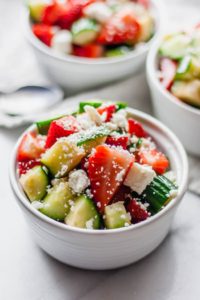
- 3 large Cucumbers skin removed, chopped
- 3 cups strawberries quartered
- 1/2 cup red onion finely chopped
- 1/4 cup basil leaves chopped
- 1/2 cup Fat Free feta cheese crumbled
For Dressing
- 1/3 cup lime juice
- 1 tablespoon olive oil
- 2 tablespoons honey
Instructions:
- Wash your hands and clean your preparation area. Rinse vegetables, fruits and herbs under cool running water before chopping.
- In a large bowl, combine the cucumbers, strawberries, red onion, and basil.
- In a small bowl or jar combine lime juice, olive oil, and honey. Whisk or shake until combined.
- Pour the dressing over the cucumber mixture and toss to combine. Top with feta cheese.
Watermelon Cucumber Balsamic Salad
Ingredients:
- 4 cups watermelon cubed
- 2 cups cucumber cubed
- 1/2 cup red onion sliced
- 1/4 cup basil chopped
- 2 tablespoon olive oil
- 1/2 cup balsamic vinegar
- 2 ounces Fat Free feta cheese crumbled
Instructions:
- Mix together watermelon, cucumber, red onion and basil.
- Mix together olive oil and balsamic vinegar then pour over the watermelon mixture.
- Top with feta cheese and enjoy!
Ingredients:

- 1 cup crushed pineapple
- 1 cup yogurt, low-fat fruit (8 ounces)
- 6 fluid ounces orange juice, frozen concentrate (thawed)
Instructions:
- Mix the ingredients in a medium-size bowl. Divide into 4 paper cups.
- Freeze until slushy – about 60 minutes. Insert a wooden stick half way through the center of each fruit pop.
- Freeze until hard or at least 4 hours. Peel away the paper cup before you eat the fruit pop.
Note: You can mix ingredients and freeze in ice cube tray instead of cups, making great “ice cubes” in fruit juice. Try other fruits or juice concentrates for variety.
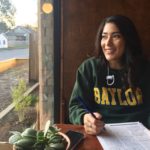
Flor De La Garza is currently pursuing a Master of Public Health degree at Baylor University. She is completing her summer practicum with Texas A&M AgriLife Extension Service in McLennan County and is working with the Better Living for Texans program. Flor is originally from Denton, TX. and has lived in Waco for about four years now. She especially enjoys learning how Waco’s organizations are working together in collaborations to reach the overall goal to improve the health and quality of life of McLennan County residents! In addition, she loves Cameron Park hiking trails, the local restaurants and food trucks!
The Act Locally Waco blog publishes posts with a connection to these aspirations for Waco. If you are interested in writing for the Act Locally Waco Blog, please email [email protected] for more information.
by Teresa Porter
I was born with the ability to hear.
I moved around a lot and landed in Waco around 2002. In the fall of 2003, I met my first Deaf person after he moved into the apartment above mine. One morning, he was trying to start his car, and it just wouldn’t start. After watching for a while, I approached and started asking questions.
At first I thought he was ignoring me, then he looked up and seemed startled by my presence. When he raised his hands and started signing, it was my turn to be startled. He repeated it twice. I slowly shook my head no, then turned and quickly went into my apartment for a pen and notepad. I learned several things that day, including how tiresome it can be to have a conversation with only a pen and paper.
One of the things he told me was, “We need interpreters more than we need mechanics.” Huh. Okay. So I left the Diesel program at TSTC and enrolled in MCC’s Interpreter program.
During the next several months, my eyes were opened to a new world, the Deaf World. I remember the first time I went to Deaf Club. I was overwhelmed, not just because I could barely spell my name in ASL, but by the beauty. So many people, so many hands, so beautiful, so noisy. It’s still hard to put it into words.
I learned the difference between deaf people and Deaf people. I learned about the role of interpreters, the cultural diversity, grammar rules, and the language and its dialects. I learned about the perspective, the pride, and the discrimination they face every day. I finished the program and failed the certification test, but set a goal to save money and try again. Funny thing about goals is, sometimes life happens.
You can’t outrun your genetics. I watched my grandmother slowly lose her hearing as she aged. I remember smirking at her when she said it would happen to me. She would urge me to use earplugs constantly. I laughed it off. I was so cocky. I grew up under the elbow of a mechanic, in a noisy environment using noisy tools, working on noisy engines. It never bothered me, and I could still listen to concertos and pick out a specific instrument and focus on it. My hearing was fine. Or so I thought.
One day I went to a fellow wrench-turner for help diagnosing a noise. He got in the car, I put it in reverse and backed out of the parking space. He got a strange expression on his face. I put it in drive and slowly rolled forward. He insisted I stop the car. He told me he wasn’t going anywhere with me until I changed the wheel bearings. I argued with him a little. I didn’t hear it. We put the car on the lift and he spun the tires. I still didn’t hear it. We disassembled one wheel. The bearing fell apart in my hand. All four wheel bearings were on the verge of locking up. We probably would have died if we had taken the car on the interstate to duplicate the noise.
I scheduled a hearing test, and left the audiologist’s office numb with brochures on hearing aids and hearing loss. I was 30. I lived in denial. I didn’t buy the hearing aids, I didn’t start using earplugs. I didn’t even cover my ears when I stood next to a race car.
For years my work schedule conflicted with Deaf Club, so I lost touch. After graduating from the program, to keep my skills from completely deteriorating, I volunteered at the Heart O’ Texas Speedway as their interpreter. Five years ago, I began having trouble understanding the announcer. Three years ago, I made my confession to the promoter. I can’t understand the announcer at all anymore. I still hear the noise, but it’s just noise. To my surprise, he told me to keep doing it. I can’t call myself an interpreter because that’s not what I do anymore. I’m the announcer for the Deaf.
Five years ago, it became harder to live in denial. I was managing a small repair shop doing everything except turning wrenches, slowly becoming increasingly frustrated with the telephone. I didn’t mind that it rang constantly, but I was really struggling to understand women and anyone with an accent. There were times that I would answer the phone, hear noise and say, “I’m sorry, a little louder and a little slower.” Noise again. “I’m sorry, one more time please?”
If they repeated the exact same phrase the exact same way, I was able to figure out what they were saying. If they changed what they said, I had to ask for more repeats. Eventually they would hang up.
There were days I got so frustrated that I would stop asking for repeats and tell them, “Look, if you found the phone number, you found the email address. Just send me an email.” Within a year I was having trouble understanding men too.
I had to tell the business owner that I could no longer perform that particular function of my job. I started trying to learn to lipread. I lost the ability to listen to the radio. (Oh, how I miss NPR!) I lost the ability to watch television without captions. I began to notice how many videos, livestreams, webinars, conference calls, etc. have no captions. It seems like a new podcast or radio interview pops up daily, sometimes an acquaintance will ask if I heard it. I smile through the small twinge of pain and ask if there’s a transcript available. They look at me like I’m from another planet. Sometimes I contact the radio show host and request a transcript, only to be ignored.
If it’s something really important, I will open one of the speech-to-text apps on my phone and play the video or audio recording. The translations can vary in accuracy, so sometimes I have to replay it multiple times using different apps, then try to piece the transcripts together and try to make sense of it. I think it’s weird to see captions on sign language videos like The Daily Moth, but no captions for WCCC-TV. If it’s important enough to tell hearing people, isn’t it important enough to tell Deaf people too?
Last year I got my first pair of reading glasses. Several months ago I noticed I was struggling to lipread more than I ever had before. I was getting more headaches, my eyes were hurting more, I was more exhausted by the end of the day. I got my eyes checked again, still the same as last year, but I noticed I had more trouble understanding the optometrist.
I hadn’t had a hearing test in a decade, so I made the appointment for the audiologist. I just knew I would end up getting a sales pitch for a hearing aid. I wasn’t expecting to see the words “too profound” and “cochlear implant.”
I played it cool as I left the office, but a few blocks away it hit me hard. Grandma wasn’t this deaf until she was 60. It’s happening too fast. Yeah, well, grandma spent her time in quiet classrooms, not around noisy race cars. Environmental plus genetic equals accelerated deafness.
Waco has a small Deaf population when compared to cities like Austin, so many people are ignorant about the federally protected rights of Deaf people. The Americans with Disabilities Act is more than 30 years old, but many businesses are unaware of their responsibilities. The ADA is a lot more than wheelchair ramps, braille, and service animals. It’s about equal access to communication and information. Federal law says you are required to provide “reasonable accommodations.”
We can negotiate on what those accommodations are, but you can’t exclude me. Expecting me to lipread around a microphone in bad lighting is unreasonable. Expecting me to lipread the back of someone’s head or the side of someone’s face is not only unreasonable, it’s impossible. Expecting me to understand more than half of what you say without an interpreter is unreasonable. Telling me I have to request an interpreter more than two weeks in advance is just ridiculous.
As my world slowly becomes quieter, I find myself more isolated. I’m alone in a crowded room filled with hearing people. Someone tells a joke, they laugh. I smile, but I have no idea what was so funny. I can only read one set of lips at a time, and some lips have no words on them. Lipreading is very difficult, and it’s very visually taxing and tiring.
My speech is still clear, I can still speak without an interpreter. I see the strange looks when I request an interpreter. I’ve even been told, “You’re not deaf.” I say, “Hear the world through my ears for one day and see for yourself.”
I speak to accommodate you. I’m not asking for an interpreter because I can’t hear, but because you don’t sign. You do want me to understand everything you say, right?
This isn’t the path “normal” people take. There is no guide for this transition. I still have a lot to learn and relearn as my hearing continues to fade. I wouldn’t know how to cope with this loss if I didn’t know about the Deaf World. I see every Deaf person as a role model. They are beautiful, strong, and so intelligent. Thanks to the local Deaf community, I know I’m not alone. Once a month, for a few short hours, I don’t have to struggle to lipread. They are my strength, my teachers, my future.
Thanks- not only to the local Deaf community, but also to famous Deaf people like Bernard Bragg, Peter Cook, Marlee Matlin, Ken Glickman, Nyle DiMarco, and so many more, my perspective is changed. This is a gift. I’ve never met a “dumb” Deaf person, but I’ve met plenty of dumb hearing people. I am not losing my hearing, I’m gaining my Deafness. I’m not disabled, I’m differently-abled. I am not “hearing impaired”, they are “Deaf impaired.” The saying is, if you love someone, you show it. Love isn’t blind. Love is DEAF.

Teresa Porter is a native Texan, automotive enthusiast, and novice gardener. In her spare time, she is a freelance writer, researcher, and community activist.
The Act Locally Waco blog publishes posts with a connection to these aspirations for Waco. If you are interested in writing for the Act Locally Waco Blog, please email [email protected] for more information.
Press release – Please join Lake Brazos Rotary Club for a weekend of fine wine and dining in downtown Waco as we raise money for Talitha Koum Institute. Everyone is welcome to attend one or both nights. Barnett’s Public House has carefully selected all of the wines for this charity event.
The World of Wine fund-raiser begins on Friday, June 7th, with a VIP dinner featuring the gourmet creations of Leah Stewart, owner of The Olive Branch. This event is from 6 p.m. to 10 p.m., with dinner starting at 7 p.m. Click here to preview the menu for Friday night.
The fund-raiser continues Saturday evening, June 8th, with a wine tasting that will include a silent auction, buffet, wine pull, and discounted cases of featured wines. The wine tasting is from 5 p.m. to 8 p.m., with VIPs having the option of arriving as early as 4 p.m.
Each ticket for Friday’s VIP dinner costs $175 and includes free entry to Saturday’s wine tasting. Individual wine-tasting tickets are $35.

